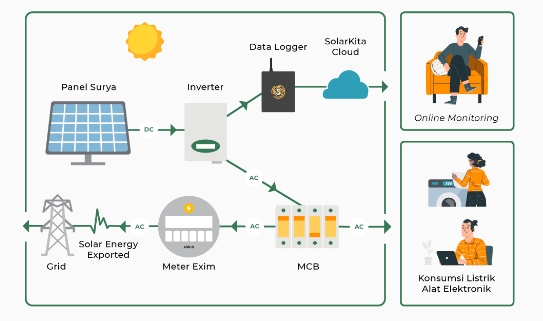SolarKita's "End-to-End" Solution for Solar Power Utilization
The company targets to acquire 1 megawatt through 330 homes by 2023
Utilization of rooftop solar power plants (PLTS) is one of the government's strategies to increase the development of renewable energy in the country. This is related to the target set by the government for the New Renewable Energy (EBT) mix of 23% in 2025. Until June 2022, the realization of the EBT mix has only reached 12,8%.
In 2018, the government issued a policy related to PV mini-grid roofs in Indonesia through the Minister of Energy and Mineral Resources No. 49/2018. This has proven to be successful in increasing the adoption of rooftop solar from only 592 customers in November 2018 to 3.781 customers in May 2021. The existing landscape encourages the presence of a number of services to support the use of this technology, one of which is SolarKita.
SolarKita was founded by three people who saw opportunities in this industry, namely Amarangga Lubis as Co-Founder & CEO, Aldamanda A. Lubis as Co-Founder & Chairman of The Board, and Bambang S. Nugroho as Co-Founder & Head of Technology.
Amarangga, who is more familiarly called Rangga, revealed the results of his study of all new renewable energy (EBT) formats. According to him, the easiest to implement is rooftop solar power. Before starting SolarKita, he had tried to use this technology, but felt that the service side was still unsatisfactory.
"I see loophole-it is on most service providers who focus only on the installation program. In fact, from the user's perspective, the experience only begins when the PLTS is installed. This is where our role is to ensure the optimal use of PV mini-grid. We developed the SolarKita platform to actively monitor and ensure all performance solar panels from users are running well," explained Rangga.
SolarKita offers services end-to-end or comprehensive, starting from consultation and education related to PV mini-grid, followed by a home survey and taking into account the conditions and situations for PV mini-grid installations. It doesn't stop there, the team will also help with the transition to PLN. For monitoring and maintenance, the company has a platform that users can use.

"Actually our goal is to make the user experience easier to transition to PV mini-grid. One thing we want to emphasize here is a solution end-to-end or comprehensively for the use of PLTS. We will be with you from the start as the technology is used," added Rangga.
So far, the players who are in direct competition with SolarKita in the industry are Xurya.
Business model and future targets
Globally, the use of PLTS is not new. However, in Indonesia, this technology is still commonly used. Even though it has received support from the government, there are still some challenges that must be faced. In terms of education, there is still a stigma that this technology is expensive, so many are reluctant to start.
In addition, there are still many who do not understand the concept. This is where SolarKita's role is to be able to provide deeper education. In addition, Rangga underlined that regulations are still dynamic, which affects execution in the field. This is also continuously pursued and communicated through the Indonesian Solar Energy Association (AESI) which focuses on accelerating the use of solar energy in Indonesia.
Regarding the business model, Rangga revealed that his business operations are quite simple by taking margins from product and service offerings. In addition, the company also provides programs referral for each individual who makes a recommendation. When it runs smoothly, consumers will get success fees.
In addition to having an impact through new and renewable energy, solar panels and PLTS are said to have opened up new industries. SolarKita admits that it also has social potential by creating job opportunities for field workers. "Here we want all communities to be involved. For the installation team in the field, we partner with individuals/PTs that we have trained. Many teams were formerly electricians or laborers. Regarding wages, we are trying to make this new industry more prosperous than what it used to be. before," said Ranga.
SolarKita also offers programs financing which collaborates with financial and non-banking institutions, such as Bank OCBC for multipurpose loans and also KoinWorks. To offer a simpler process, the company also provides options rent-to-own with a similar concept to the installment program for users who want to take advantage of PLTS.
As of last year, SolarKita has become part of the New Energy Nexus portfolio. The company is engaged and forms an ecosystem of funding, programs and networks that support startups and entrepreneurs in the clean energy sector. Currently the company has also joined the network WIND, as a bridge that connects investors and entrepreneur.
Until now, 80% of SolarKita's users come from residential. The company has representative teams in Greater Jakarta, Surakarta, and Bali. In the future, Rangga said he wants to expand to big cities in Indonesia. The target, the company wants to acquire 1 megawatt through about 330 homes by 2023.
-
Disclosure: This article was published in collaboration with DailySocial.id and WIND for the Startup Impact Indonesia series. ANGIN also helps in curating related startups.
Sign up for our
newsletter
